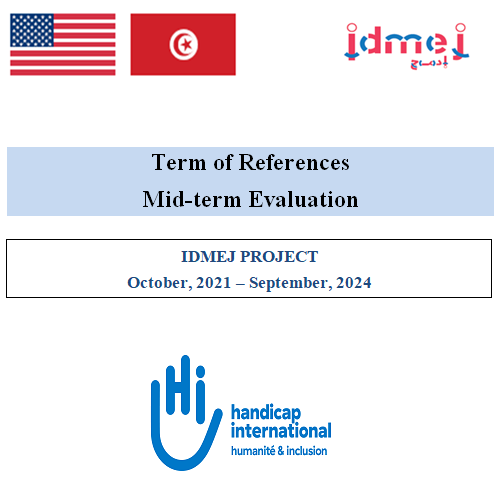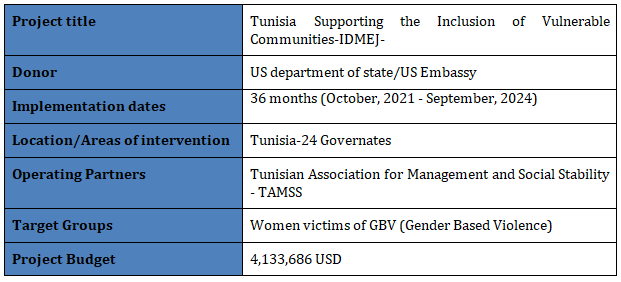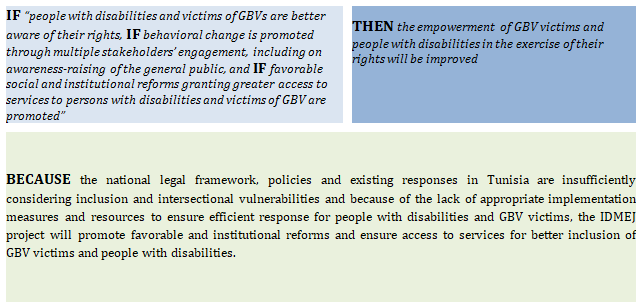Appel à consultant-HI Retour vers les opportunités
Humanité & Inclusion (Handicap International )
Lance Appel à candidaturesÉchéance
08 Septembre 2023 Il y a 8 months
Partager l'opportunité sur
Détails de l'opportunité
Term of References
Mid-term Evaluation
IDMEJ PROJECT
October, 2021 – September, 2024
I. General information
1/ About Humanity & Inclusion
Handicap International ‘’Humanity & Inclusion’’ HI is an independent and impartial aid organization working in situations of poverty and exclusion, conflict and disaster. We work alongside people with disabilities and vulnerable populations, taking action and bearing witness in order to respond to their essential needs, improve their living conditions and promote respect for their dignity and fundamental rights.
2/ About Humanity & Inclusion in Tunisia
HI has been active in Tunisia since 1992, and has had a permanent presence in the country since 1997, under a general cooperation agreement signed with the Ministry of Foreign Affairs.
The actions developed by HI in Morocco, Tunisia and Libya are grouped within a single program, whose regional office is based in Tunis.
Tunisia ratified the International Convention on the Rights of Persons with Disabilities in 2008. However, disabled people are still not sufficiently taken into account in the development of public policies.
HI runs numerous projects to improve access to inclusive, quality services, a protective environment and independent living opportunities for vulnerable populations, including people with disabilities.
In the field of economic inclusion, HI aims to create better employment opportunities for people with disabilities, particularly women and young people, through multi-stakeholder dynamics and support for the inclusion of people, businesses, employment players (public and private) and civil society.
HI also works to ensure that vulnerable populations are taken into account and included in governance mechanisms and national strategies.
HI also carries out activities to improve the care and inclusion of children with autism spectrum disorders, by promoting better early identification, social inclusion, inclusion in mainstream schools and raising awareness of autism.
HI also aims to build the capacity of Tunisian institutions and provide technical support to help victims of gender-based violence and people with disabilities enforce laws protecting their rights.
Handicap International ‘’Humanity & Inclusion’’ HI is an independent and impartial aid organization working in situations of poverty and exclusion, conflict and disaster. We work alongside people with disabilities and vulnerable populations, taking action and bearing witness in order to respond to their essential needs, improve their living conditions and promote respect for their dignity and fundamental rights.
II. Context of the evaluation
1/ Presentation of IDMEJ project
The goal of the project implemented by Humanity & Inclusion (HI) and its partner Tunisian Association for Management and Social Stability (TAMSS) is to empower Gender-Based Violence survivors and People with Disabilities in Tunisia in the exercise of their rights, by creating greater awareness, multi-stakeholders’ engagement for attitudinal/behavioral change, and promotion of favorable social and institutional reforms granting greater access to services.
The project is implemented in close collaboration with the Ministry of Socials Affairs and the Ministry of Women Affairs – at national and decentralized levels.
The project aims to support the Tunisian institutions and other stakeholders to better identify and understand the specific needs of people with disabilities and Gender-Based Violence survivors (including People with Disabilities) in order to calibrate public policies and their implementation at decentralized levels, and to use public resources more effectively and efficiently to strengthen their response and services. In that purpose, the project focus on developing efficient disability and gender data collection, monitoring and analysis mechanisms. Stakeholders –duty bearers, service providers, Civil Society Organizations- are supported and equipped to better address the needs of people with disabilities and Gender-Based Violence survivors and feed the advocacy strategy towards the development of more inclusive policies and efficient implementation measures. In addition, the intervention strategy focus on access to information of people with disabilities and Gender-Based Violence survivors on their rights and on existing local support mechanisms, as well as deliver campaigns to reduce stigma and to positively change mindsets and behaviors for a better inclusion of persons with disabilities and reduction of Gender-Based Violence.
Humanity & Inclusion and the Tunisian Association for Management and Social Stability contribute to the project in complementary, by bridging the gap in expertise and knowledge, and by bringing into the project their respective experience, resources, relationships and long-term commitment for a common goal.
IDMEJ’s approach is based on the following Theory of Change (ToC)
2/ Justification of the evaluation
The internal evaluation is an integral part of the project agreement existing between HI the US department of state/US Embassy.
Midterm evaluation is a key element of the HI’s Project Quality Policy (PQP).
The following principles define the purpose of the PQP policy:
- Quality: To help ensure and demonstrate the performance and results of our projects.
- Learning: Contributing to the continuous improvement of interventions.
- Accountability: Strengthen our ability to account for our actions and the achievement of the project’c objectives.
III. Objectives of the evaluation
1/ Overall objectives and expectations of the evaluation
The purpose of this evaluation is to determine the progress towards the project objectives and quality of the activities carried out, and thanks to the recommendations that will be made, improve/adjust the actions to be implemented.
This exercise aims at identifying strengths and weaknesses of the project, which will guide the project towards improvement during the current implementing period and for planning of the next implementing period. The evaluation is a part of a learning process.
2/ Evaluation Questions
The main evaluation questions to be explored within the mid-term evaluation are:
On the basis of the HI Quality Framework and the evaluation questions the mid-term evaluation will prioritize three criteria among the seven HI quality standards (relevance, change, compliance, efficiency, effectiveness, accountability to population and partnership);
- Relevance
- Has the project sufficiently adapted its actions to the context of the country of intervention?
- Has the project been adequately integrated with other interventions in the intervention area?
- Effectiveness
- Do the results obtained contribute to the achievement of the project objective?
- Is the technical quality of the project achievements in line with HI’s technical standards and/or international standards?
- Partnership
- Have partners been actively involved in the decision-making processes, implementation, achievement of objectives and success of the project?
- Are the partnerships developed by the project relevant and effective in achieving the project objectives?
IV. Evaluation methodology
1/ Methodology
The proposed methodology for this mid-term evaluation is a combination of qualitative and quantitative data collection method that might include a sample survey, focus group discussions (FDGs), key informant interviews (KIIs), as well as a desk review of secondary data and reporting documents.
The midterm evaluation will make use of performance monitoring data collected during the course of program implementation as well as data collected specifically for the midterm assessment.
The evaluation will be conducted mainly in Tunis. Field visits to services providers and partners within 3 to 5 regions of Tunisia are also envisaged.
2/ Actors involved in the evaluation
The main actors to be involved for this mid-evaluation are:
- Internal:
- Project team (HI and TAMSS)
- Project consultants (communication agency, consultant involved in the development of the QR code platform, consultant involved in conducting the accessibility assessment of the available services, GBV consultants etc.)
- External:
- Members of the steering committee and technical committees:
- Observatory for the prevention of violence against women
- National Statistical Institute
- Ministry of Social Affairs
- Ministry of Women Affairs
- Service providers (professionals of the VBG services and the green line who benefited of capacity building activities)
- Civil Society Organizations involved in sensitization and advocacy activities
- Final beneficiaries: people with disabilities, VBG survivors.
The final list of actors will be finalized during the kick off meeting.
HI and TAMSS will coordinate the meeting between the selected evaluation consultant and the project stakeholders.
V. Expected deliverables and proposed schedule
1/ Deliverables
- An inception report refining / specifying the proposed methodology for answering the evaluation questions and an action plan. This inception report will have to be validated by the project team.
- Data collection materials that include all materials and tools such as structured and semi structured questionnaires to be used throughout the assignment.
- Data collected during the assignments
- A presentation document presenting the first results, conclusions and recommendations, to be presented to the Steering Committee.
- A draft report of around 20 to 30 pages maximum. This report will be reviewed by the selection committee and/or its representative.
- A final report of approximately 20-30 pages maximum and following annexes:
- Data collected
- Bibliography of the secondary data reviewed
- Tools and questionnaires
The final report must include recommendations to guide the consortium members in the improvement of the current intervention. These recommendations should concern all objectives of the project.
HI will provide the template for the final report and the quality of the report will be reviewed by the steering committee.
2/ Mid-term Evaluation schedule
Key steps of the evaluation schedule will include:
- Initial briefings with HI team for project presentation, sharing documentation and agreement on evaluation schedule
- Development of data collection tools;
- Submission and approval of an inception report including data collection tools;
- Data Collection;
- Submission of preliminary findings with HI team and project partners
- Submission of draft report;
- Incorporating stakeholders’ feedback in draft report;
- Final draft submission and validation by HI.
Timeline and deliverables can be adjusted within the consultant technical offer but it won’t exceed 20 working days.
VI. Means
1/ Consultant Skills and Competencies
-
- Individual or legal entity (consultancy firm or independent consultant)
- Minimum qualification: Master’s degree in the field of human rights, social and political sciences, or a related field
- Experience (minimum 5 years) in conducting project evaluations, particularly in the field of GBV and disability
- Established and recognized experience in participatory qualitative data collection, processing and analysis methods
- Demonstrated capacity for analysis, synthesis and writing (provide a sample of publications)
- Excellent knowledge of the cultural context of the areas of intervention
- Fluency in Arabic, English and French
- Previous experience with the US government funded project is an asset
2/ Consultancy duration
The assignment will be completed in 20 working days (between end of September and November 2023). The deadline for delivery of final report is November 20th 2023.
3/ Section criteria and scoring
- Understanding of ToRs and evaluation objectives: (20%)
- Proposed methodology and planning/schedule: (20%)
- Expertise in conducting evaluations and expertise in the project thematic: (30%)
- Financial offer: (30%)
VII. Principles and values
1/ Protection and Anti-Corruption Policy
- Appendix 1: Code of Conduct
- Appendix 2: Protection of beneficiaries from sexual exploitation, abuse and harassment
- Appendix 3: Child Protection Policy
- Appendix 4: Anti-fraud and anti-corruption policy
2/ Ethical measures
As part of each evaluation, HI is committed to upholding certain ethical measures. Thus, it is imperative that the selected consultant will take into account these measures in the technical offer:
- Guarantee the safety of participants, partners and teams: the technical offer must specify the risk mitigation measures.
- Ensuring a person/community-centred approach: the technical offer must propose methods adapted to the needs of the target population (e.g. tools adapted for illiterate audiences / sign language / etc.).
- Obtain the free and informed consent of the participants: the technical proposal must explain how the evaluator will obtain the free and informed consent and/or assent of the
- Ensure the security of personal and sensitive data throughout the activity: the technical offer must propose measures for the protection of personal data.
VIII. Appendicies (links)
- La Politique Age, Genre, Handicap which must guide the approach and the construction of evaluation tools in the technical offer.
- Le Référentiel qualité de HI, on which any evaluator must base his evaluation
L'opportunité a expiré
Cette opportunité n'est malheureusement plus disponible sur Jamaity. Visitez régulièrement la rubrique opportunités pour ne plus en rater.
Suivez Jamaity sur LinkedIn
Obtenez Jamaity Mobile dès maintenant

Appel à candidatures Publié sur Jamaity le 10 August 2023
Découvrez encore plus d'opportunités sur Jamaity en cliquant sur ce lien.



